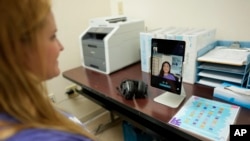Student Union
Lacking Counselors, US Schools Turn to Booming Business of Online Therapy

Trouble with playground bullies started for Maria Ishoo's daughter in elementary school. Girls ganged up, calling her "fat" and "ugly." Boys tripped and pushed her. The California mother watched her typically bubbly second-grader retreat into her bedroom and spend afternoons curled up in bed.
For Valerie Aguirre's daughter in Hawaii, a spate of middle school "friend drama" escalated into violence and online bullying that left the 12-year-old feeling disconnected and lonely.
Both children received help through telehealth therapy, a service that schools around the country are offering in response to soaring mental health struggles among American youth.
Now at least 16 of the 20 largest U.S. public school districts are offering online therapy sessions to reach millions of students, according to an analysis by The Associated Press. In those districts alone, schools have signed provider contracts worth more than $70 million.
The growth reflects a booming new business born from America's youth mental health crisis, which has proven so lucrative that venture capitalists are funding a new crop of school teletherapy companies. Some experts raise concerns about the quality of care offered by fast-growing tech companies.
As schools cope with shortages of in-person practitioners, however, educators say teletherapy works for many kids, and it's meeting a massive need. For rural schools and lower-income students in particular, it has made therapy easier to access. Schools let students connect with online counselors during the school day or after hours from home.
"This is how we can prevent people from falling through the cracks," said Ishoo, a mother of two in Lancaster, California.
Ishoo recalls standing at her second-grader's bedroom door last year and wishing she could get through to her. "What's wrong?" the mother would ask. The response made her heart heavy: "It's NOTHING, Mom."
Last spring, her school district launched a teletherapy program and she signed up her daughter. During a month of weekly sessions, the girl logged in from her bedroom and opened up to a therapist who gave her coping tools and breathing techniques to reduce anxiety. The therapist told her daughter: You are in charge of your own emotions. Don't give anyone else that control.
"She learned that it's OK to ask for help, and sometimes everyone needs some extra help," Ishoo said.
The 13,000-student school system, like so many others, has counselors and psychologists on staff, but not enough to meet the need, said Trish Wilson, the Lancaster district's coordinator of counselors.
Therapists in the area have full caseloads, making it impossible to refer students for immediate care, she said. But students can schedule a virtual session within days.
"Our preference is to provide our students in-person therapy. Obviously, that's not always possible," said Wilson, whose district has referred more than 325 students to over 800 sessions since launching the online therapy program.
Students and their parents said in interviews they turned to teletherapy after struggling with feelings of sadness, loneliness, academic stress and anxiety. For many, the transition back to in-person school after distance learning was traumatic. Friendships had fractured, social skills deteriorated and tempers flared more easily.
Schools are footing the bill, many of them using federal pandemic relief money as experts have warned of alarming rates of youth depression, anxiety and suicide. Many school districts are signing contracts with private companies. Others are working with local health care providers, nonprofits or state programs.
Mental health experts welcome the extra support but caution about potential pitfalls. For one, it's getting harder to hire school counselors and psychologists, and competition with telehealth providers isn't helping.
"We have 44 counselor vacancies, and telehealth definitely impacts our ability to fill them," said Doreen Hogans, supervisor of school counseling in Prince George's County, Maryland. Hogans estimates 20% of school counselors who left have taken teletherapy jobs, which offer more flexible hours.
The rapid growth of the companies raises questions about the qualifications of the therapists, their experience with children and privacy protocols, said Kevin Dahill-Fuchel, executive director of Counseling in Schools, a nonprofit that helps schools bolster traditional, in-person mental health services.
"As we give these young people access to telehealth, I want to hear how all these other bases are covered," he said.
One of the biggest providers, San Francisco-based Hazel Health, started with telemedicine health services in schools in 2016 and expanded to mental health in May 2021, CEO Josh Golomb said. It now employs more than 300 clinicians providing teletherapy in over 150 school districts in 15 states.
The rapid expansions mean millions of dollars in revenue for Hazel. This year, the company signed a $24 million contract with Los Angeles County to offer teletherapy services to 1.3 million students for two years.
Other clients include Hawaii, which is paying Hazel nearly $4 million over three years to work with its public schools, and Clark County schools in the Las Vegas area, which have allocated $3.25 million for Hazel-provided teletherapy. The districts of Miami-Dade, Prince George's and Houston schools also have partnered with Hazel.
Despite the giant contracts, Golomb said Hazel is focused on ensuring child welfare outweighs the bottom line.
"We have the ethos of a nonprofit company but we're using a private-sector mechanism to reach as many kids as we can," Golomb said. Hazel raised $51.5 million in venture capital funding in 2022 that fueled its expansion. "Do we have any concerns about any compromise in quality? The resounding answer is no."
Other providers are getting into the space. In November, New York City launched a free telehealth therapy service for teens to help eliminate barriers to access, said Ashwin Vasan, the city's health commissioner. New York is paying the startup TalkSpace $26 million over three years for a service allowing teens aged 13 to 17 to download an app and connect with licensed therapists by phone, video or text.
Unlike other cities, New York is offering the service to all teens, whether enrolled in private, public or home schools, or not in school at all.
"I truly hope this normalizes and democratizes access to mental health care for our young people," Vasan said.
Many of Hawaii's referrals come from schools in rural or remote areas. Student clients have increased sharply in Maui since the deadly August wildfires, said Fern Yoshida, who oversees teletherapy for the state education department. So far this fall, students have logged 2,047 teletherapy visits, a three-fold increase from the same period last year.
One of them was Valerie Aguirre's daughter, whose fallout with two friends turned physical last year in sixth grade, when one of the girls slapped her daughter in the face. Aguirre suggested her daughter try teletherapy. After two months of online therapy, "she felt better," Aguirre said, with a realization that everyone makes mistakes and friendships can be mended.
In California, Ishoo says her daughter, now in third grade, is relaying wisdom to her sister, who started kindergarten this year.
"She walks her little sister to class and tells her everything will be OK. She's a different person. She's older and wiser. She reassures her sister," Ishoo said. "I heard her say, 'If kids are being mean to you, just ignore them.'"
See all News Updates of the Day
- By VOA News
Competition grows for international students eyeing Yale

It’s tough to gain admission to Yale University, and it’s getting even tougher for international students as standout students from around the world set their sights on Yale.
The Yale Dale News, the campus newspaper, takes a look at the situation here.
- By VOA News
Student from Ethiopia says Whitman College culture made it easy to settle in

Ruth Chane, a computer science major from Ethiopia, writes about her experiences settling into student life at Whitman College in the U.S. state of Washington.
"The community at Whitman College made sure I felt welcomed even before I stepped foot on campus," she says.
- By VOA News
Claremont Colleges student gets a shock when she heads home to Shanghai

In The Student Life, the student newspaper for the Claremont Colleges, a consortium of five liberal art colleges and two graduate schools in Claremont, California, student Rochelle Lu writes about readjusting to her Shanghai home after spending a semester in the United States.
- By VOA News
Cedarville University aims to ease transition for international students

Cedarville University in the U.S. state of Ohio says it’s got more than 140 international students representing 44 countries.
Here, the school interviews Jonathan Sutton, director of international student services. He talks about his job and the opportunities for international students on campus.
- By VOA News
Morehouse College offers prospective students tips on applying and thriving

Morehouse College, a private, historically Black liberal arts college in the U.S. state of Georgia, offers a guide for international students interested in attending the school.
Among the tips to apply and thrive at Morehouse:
- Take advantage of the school’s orientation program
- Turn to the school’s Center for Academic Success for tutoring, support and more
- Immerse yourself in campus life via clubs and societies
- By Reuters
US reviews Columbia University contracts, grants over antisemitism allegations

The administration of President Donald Trump said on Monday it will review Columbia University's federal contracts and grants over allegations of antisemitism, which it says the educational institution has shown inaction in tackling.
Rights advocates note rising antisemitism, Islamophobia and anti-Arab bias since U.S. ally Israel's devastating military assault on Gaza began after Palestinian Hamas militants' deadly October 2023 attack.
The Justice Department said a month ago it formed a task force to fight antisemitism. The U.S. Departments of Health and Education and the General Services Administration jointly made the review announcement on Monday.
"The Federal Government's Task Force to Combat Anti-Semitism is considering Stop Work Orders for $51.4 million in contracts between Columbia University and the Federal Government," the joint statement said.
The agencies said no contracting actions had been taken yet.
"The task force will also conduct a comprehensive review of the more than $5 billion in federal grant commitments to Columbia University."
The agencies did not respond to requests for comment on whether there were similar reviews over allegations of Islamophobia and anti-Arab bias.
Columbia had no immediate comment. It previously said it made efforts to tackle antisemitism.
College protests
Trump has signed an executive order to combat antisemitism and pledged to deport non-citizen college students and others who took part in pro-Palestinian protests.
Columbia was at the center of college protests in which demonstrators demanded an end to U.S. support for Israel due to the humanitarian crisis caused by Israel's assault on Gaza. There were allegations of antisemitism and Islamophobia in protests and counter-protests.
During last summer's demonstrations around the country, classes were canceled, some university administrators resigned and student protesters were suspended and arrested.
While the intensity of protests has decreased in recent months, there were some demonstrations last week in New York after the expulsion of two students at Columbia University-affiliated Barnard College and after New York Governor Kathy Hochul ordered the removal of a Palestinian studies job listing at Hunter College.
A third student at Barnard College has since been expelled, this one related to the occupation of the Hamilton Hall building at Columbia last year.
Canada’s immigration overhaul signals global shift in student migration
From Europe to North America, nations are tightening their immigration policies. Now Canada, long seen as one of the world's most welcoming nations, has introduced sweeping changes affecting international students. The reforms highlight a growing global trend toward more restrictive immigration policies. Arzouma Kompaore reports from Calgary.
Trump administration opens antisemitism inquiries at 5 colleges, including Columbia and Berkeley

The Trump administration is opening new investigations into allegations of antisemitism at five U.S. universities including Columbia and the University of California, Berkeley, the Education Department announced Monday.
It's part of President Donald Trump's promise to take a tougher stance against campus antisemitism and deal out harsher penalties than the Biden administration, which settled a flurry of cases with universities in its final weeks. It comes the same day the Justice Department announced a new task force to root out antisemitism on college campuses.
In an order signed last week, Trump called for aggressive action to fight anti-Jewish bias on campuses, including the deportation of foreign students who have participated in pro-Palestinian protests.
Along with Columbia and Berkeley, the department is now investigating the University of Minnesota, Northwestern University and Portland State University. The cases were opened using the department's power to launch its own civil rights reviews, unlike the majority of investigations, which stem from complaints.
Messages seeking comment were left with all five universities.
A statement from the Education Department criticized colleges for tolerating antisemitism after Hamas' Oct. 7, 2023, attack on Israel and a wave of pro-Palestinian protests that followed. It also criticized the Biden administration for negotiating "toothless" resolutions that failed to hold schools accountable.
"Today, the Department is putting universities, colleges, and K-12 schools on notice: this administration will not tolerate continued institutional indifference to the wellbeing of Jewish students on American campuses," said Craig Trainor, the agency's acting assistant secretary for civil rights.
The department didn't provide details about the inquiries or how it decided which schools are being targeted. Presidents of Columbia and Northwestern were among those called to testify on Capitol Hill last year as Republicans sought accountability for allegations of antisemitism. The hearings contributed to the resignation of multiple university presidents, including Columbia's Minouche Shafik.
An October report from House Republicans accused Columbia of failing to punish pro-Palestinian students who took over a campus building, and it called Northwestern's negotiations with student protesters a "stunning capitulation."
House Republicans applauded the new investigations. Representative Tim Walberg, chair of the Education and Workforce Committee, said he was "glad that we finally have an administration who is taking action to protect Jewish students."
Trump's order also calls for a full review of antisemitism complaints filed with the Education Department since Oct. 7, 2023, including pending and resolved cases from the Biden administration. It encourages the Justice Department to take action to enforce civil rights laws.
Last week's order drew backlash from civil rights groups who said it violated First Amendment rights that protect political speech.
The new task force announced Monday includes the Justice and Education departments along with Health and Human Services.
"The Department takes seriously our responsibility to eradicate this hatred wherever it is found," said Leo Terrell, assistant attorney general for civil rights. "The Task Force to Combat Anti-Semitism is the first step in giving life to President Trump's renewed commitment to ending anti-Semitism in our schools."
- By VOA News
STEM, business top subjects for international students

The Times of India breaks down the most popular subjects for international students to study in the U.S.
STEM and business lead the pack. Read the full story here. (January 2025)
- By VOA News
Safety and visa difficulties among misconceptions about US colleges

U.S. News & World report addresses some of the misconceptions about U.S. colleges and universities, including the difficulty of getting a visa.
Read the full story here. (January 2025)
- By VOA News
Work opportunities help draw international students to US schools

US News & World Report details the three top factors in foreign students' decision to study in the U.S. They include research opportunities and the reputation of U.S. degrees. Read the full story here. (December 2024)
- By VOA News
British student talks about her culture shock in Ohio

A British student who did a year abroad at Bowling Green State University in Ohio talks about adjusting to life in America in a TikTok video, Newsweek magazine reports.
Among the biggest surprises? Portion sizes, jaywalking laws and dorm room beds.
Read the full story here. (December 2024)
- By VOA News
Harvard's Chan School tells international students what to expect

Harvard's T.H. Chan School of Public Health reaches out to international students by detailing the international student experience at the school.
Learn more about housing, life in Boston and more here.
- By Reuters
China unveils plan to build 'strong education nation' by 2035

China issued its first national action plan to build a "strong education nation" by 2035, which it said would help coordinate its education development, improve efficiencies in innovation and build a "strong country."
The plan, issued Sunday by the Communist Party's central committee and the State Council, aims to establish a "high quality education system" with accessibility and quality "among the best in the world."
The announcement was made after data on Friday showed China's population fell for a third consecutive year in 2024, with the number of deaths outpacing a slight increase in births, and experts cautioning that the downturn will worsen in the coming years.
High childcare and education costs have been a key factor for many young Chinese opting out of having children, at a time when many face uncertainty over their job prospects amid sluggish economic growth.
"By 2035, an education power will be built," the official Xinhua news agency said, adding that China would explore gradually expanding the scope of free education, increase "high-quality" undergraduate enrolment, expand postgraduate education, and raise the proportion of doctoral students.
The plan aims to promote "healthy growth and all-round development of students," making sure primary and secondary school students have at least two hours of physical activity daily, to effectively control the myopia, or nearsightedness, and obesity rates.
"Popularizing" mental health education and establishing a national student mental health monitoring and early warning system would also be implemented, it said.
It also aims to narrow the gap between urban and rural areas to improve the operating conditions of small-scale rural schools and improve the care system for children with disabilities and those belonging to agricultural migrant populations.
The plan also aims to steadily increase the supply of kindergarten places and the accessibility of preschool education.
- By VOA News
A look at financial aid options for international graduate students in US

The Open Notebook, a site focusing on educating journalists who cover science, has complied a list of U.S. graduate program financial aid information for international students.


